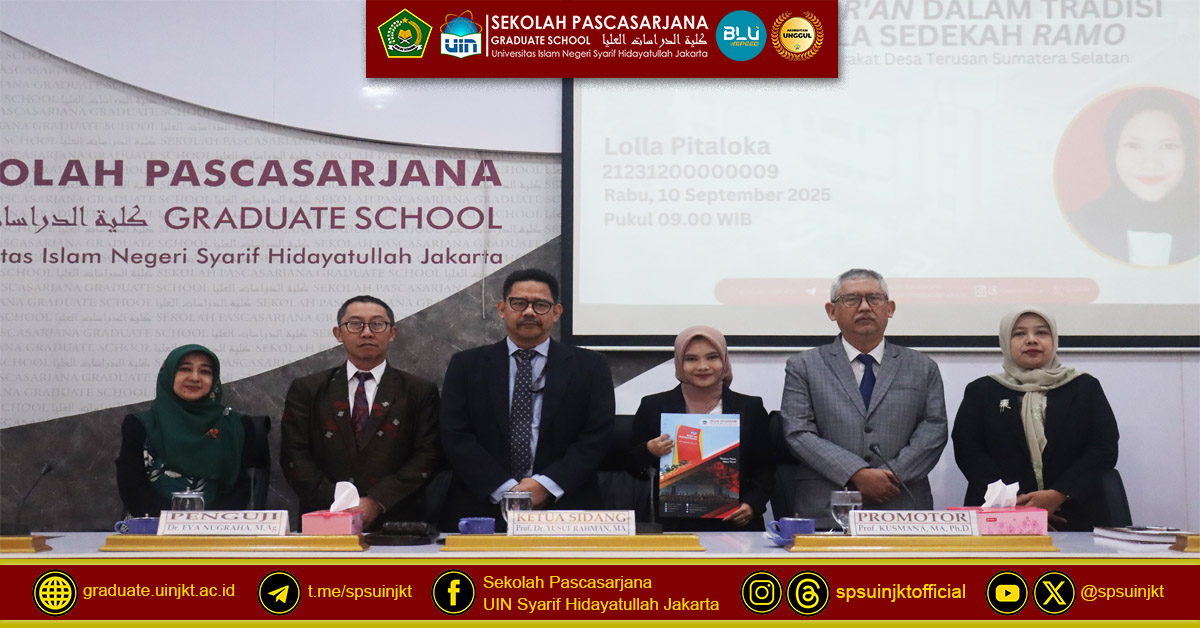Lolla Pitaloka Thesis Examination, Living Qur'an in the Ramo Alms Rejecting Tradition
Auditorium Prof. Dr. Suwito, MA SPs UIN Jakarta, SPs NEWS: The Graduate School of Syarif Hidayatullah State Islamic University Jakarta held the 2784th Thesis Examination at the Prof. Dr. Suwito Auditorium, MA SPs UIN Jakarta, on Wednesday, 10 September 2025 with candidate Lolla Pitaloka.
Lolla Pitaloka is a student of the Master of Islamic Studies programme with a concentration in Tafsir. Lolla wrote a thesis entitled "Living Qur'an in the Ramo Sedekah Rejecting Bala Tradition: A Reception Study of the Terusan Village Community, South Sumatra".
This research not only provides a new understanding of the meaning of the Qur'anic verses, but also shows how the sacred text is lived in the daily practice of the community.
This research departs from an interesting phenomenon in the village of Terusan, South Sumatra, namely the tradition of rejecting bad luck sedekah ramo. In this tradition, the recitation of Qur'anic verses is an integral part. Lolla realised that behind the ritual, there are deep meanings and receptions from the community that need to be analysed. Lolla chose to use a qualitative approach with a field research method to directly understand how the local community interprets and practices the teachings of the Qur'an in their cultural context.
Using two main theoretical frameworks, namely Clifford Geertz's interpretive symbolic theory and Hans Robert Jauss's reception theory, Lolla managed to descriptively and analytically describe the meanings contained. Geertz's theory helped her uncover hidden symbolic meanings, while Jauss's theory allowed for an analysis of how the community as active subjects "received" and "perceived" the sacred text. This approach distinguishes her research from other studies that tend to place society as a passive object.
The results of her research show that the recitation of Qur'anic verses in the tradition of sedekah ramo has diverse symbolic meanings. In the general aspect, this recitation is interpreted as a prayer for protection from all dangers. This reflects the basic human need for a sense of security and tranquillity. Through the recitation of holy verses, the community feels protected by an almighty power.
More deeply, from a religious perspective, this tradition is interpreted as a form of appreciation of the values of tawhid, worship and Islamic morals. People do not just read, but also live every meaning contained. This shows that local traditions can be an effective medium to strengthen religious beliefs and practices.
While in the cultural aspect, the recitation of the Qur'anic verses is interpreted as a ritual to ward off bad luck and a collective symbol. This symbol serves to strengthen community identity and solidarity. When the whole community is involved in the same ritual, their social ties are closer. This tradition becomes the glue that unites the community in Terusan Village.
Lolla's research also reveals specifically the community's exegetical reception of several surahs, such as Surah Al-Fātiḥah, Al-Ikhlās, Al-Falaq, Al-Nās, Al-Fīl and the verse of Kursi. The people of Terusan Village understand these suras as an affirmation of Allah's absolute power that encompasses the entire universe, as well as His protection of His servants. Functionally, this belief provides a sense of security as they believe they have invoked protection through these prayers.
Lolla argues that the tradition of sedekah ramo is a form of actualisation of the living Qur'an. This is evidence that the holy verses do not only function as dead texts, but are also alive and meaningful in the local cultural space. This thesis successfully shows that Islam and local culture can enrich each other, creating religious practices that are relevant and profound for the community.
The difference between this thesis and previous research, such as that conducted by Amylia Karunia Ar (2018), lies in the methodological approach. If Amylia's research shows a critical attitude and places the community as objects that need to be given understanding, Lolla's thesis instead places the community as active subjects in a meaningful reception process. They are not passive recipients, but individuals who actively interpret the text according to their horizon of expectations, experiences and social context.
Overall, Lolla's research is an important contribution to the study of Living Qur'an, Living Hadith, and local culture. This thesis opens our eyes that people's religious understanding cannot be seen from one side only. Lolla's success in defending her thesis is proof that the combination of religious teachings and local wisdom is a wealth that needs to be studied and preserved.
Lolla Pitaloka successfully defended her thesis under the guidance of Prof. Kusmana, MA, Ph.D, and was tested before a board of examiners consisting of Prof. Dr. Yusuf Rahman, MA, Prof. Kusmana, MA, Ph.D, Dr. Eva Nugraha, M.Ag and Dr. Lilik Ummi Kaltsum, MA.
After paying attention to the writing of the thesis, the comments of the examining team and the candidate's answers, the examining team determined that Lolla Pitaloka graduated with a Very Satisfactory predicate. Lolla Pitaloka is the 2784th Doctor in the field of Islamic Studies, at the master programme of the Graduate School of UIN Syarif Hidayatullah Jakarta.(JA)

